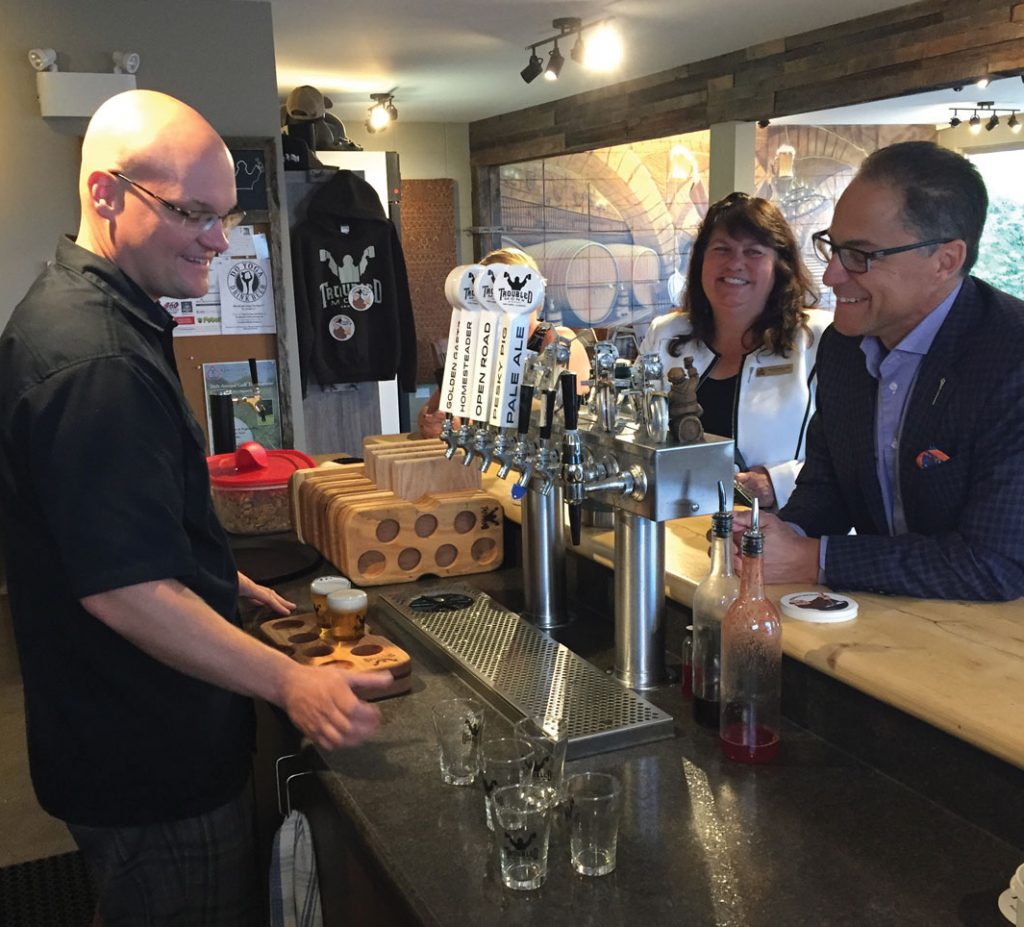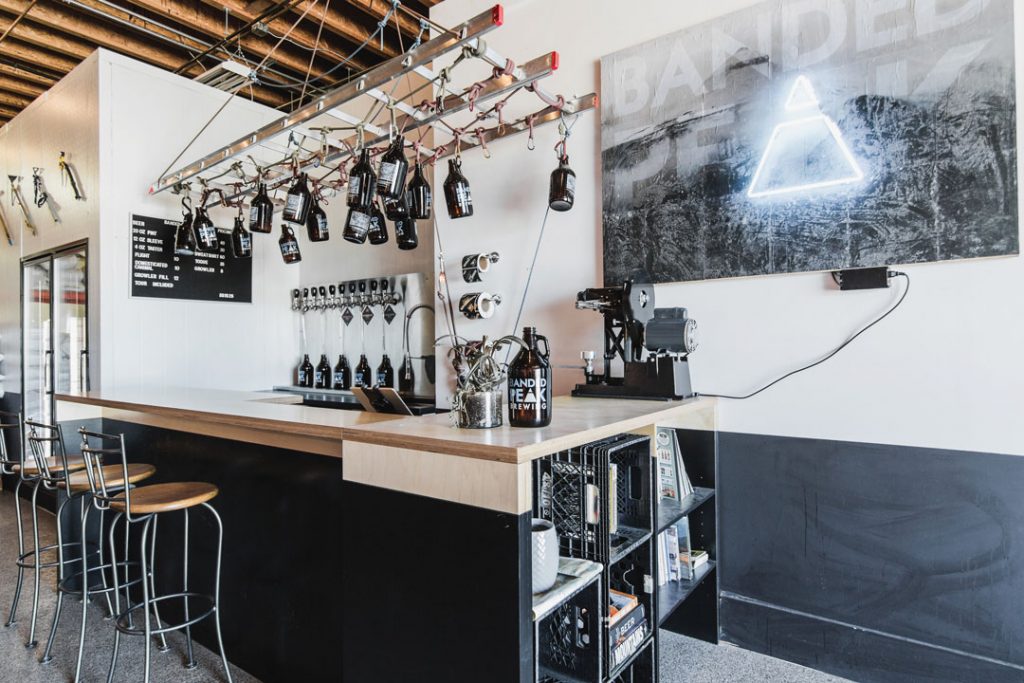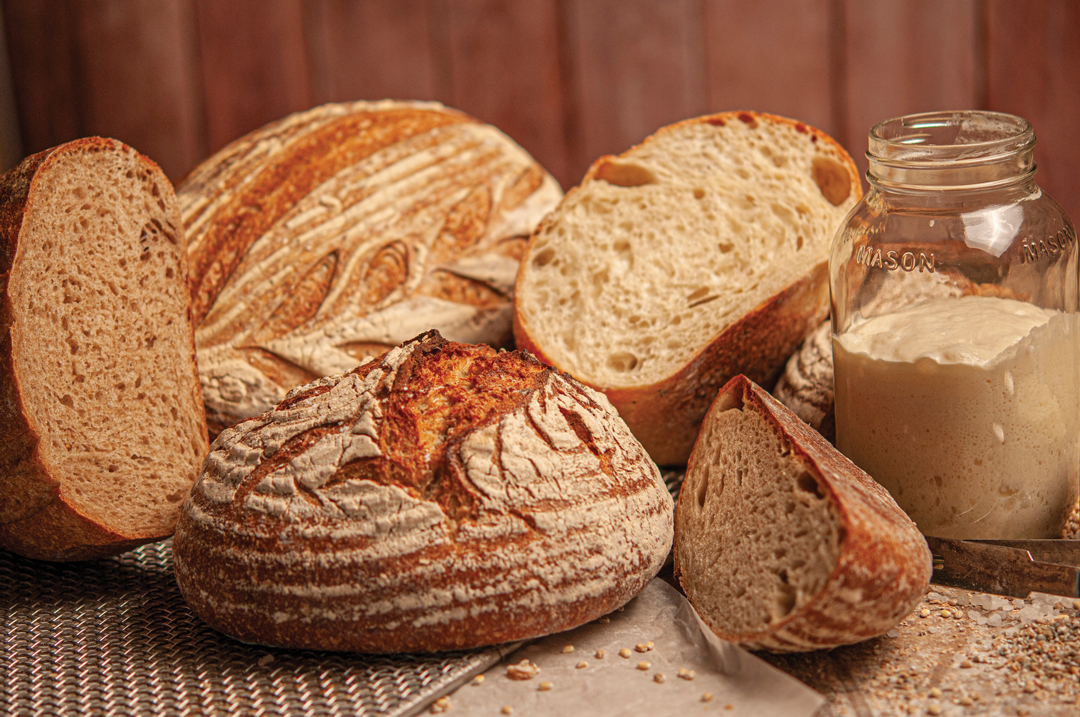SUBSIDIZED SUDS
SASKATCHEWAN AND B.C. CRY FOUL AS ALBERTA GOVERNMENT EXTENDS SUPPORT FOR LOCAL BREWERIES
BY TYLER DIFLEY
For years, the Alberta government has struggled to reconcile efforts to promote the province’s craft brewing industry with a privatized liquor system that attracts hundreds of breweries from around the world to vie for consumer dollars. In its most recent attempt to give local beer a fighting chance against out-of-province competition, the government has made sweeping changes to provincial beer markups and introduced a new grant program for Alberta breweries.
Under the new system, beer sold in the province has a $1.25-per-litre markup applied to its wholesale price. This markup rate applies to all breweries that sell beer in the province, regardless of where they are located and their annual production volumes. Previously, beer markups in the province were applied using a graduated scale, with reduced rates for breweries with small annual production volumes.
To offset the cost of this markup for small breweries and allow them to maintain their current beer prices, the government created the Alberta Small Brewers Development Program, which provides monthly grants to brewers based on their production and sales volumes. All Alberta breweries that produce and sell up to 300,000 hectolitres of beer annually are eligible for the grants. Under the new grant system, breweries that sell 10,256 hectolitres of beer per year or less will receive $1.15 per litre—the exact difference between the old graduated markup for that brewery size (10 cents per litre) and the new blanket markup. The grant amount decreases as a brewery’s annual sales volume goes up, and the government expects to dole out $20 million through the program over the next 10 years.
As a result of the new system, the price of Alberta-brewed beers should remain relatively constant, while out-of-province brewers will be forced to up their retail prices—making it more attractive than ever for Alberta beer lovers to drink local.
“I think it’s really beneficial for us,” said Matthew Berard, one of the co-founders of Banded Peak Brewing in Calgary. “It’s making small breweries much more viable.”
Together, the new grant program and blanket markup provide the financial support Alberta’s craft breweries need in order to become established and compete in an increasingly crowded marketplace. More importantly, these changes appear to level the uneven playing field that had come to characterize the Alberta market.
For several years, breweries from provinces with generous economic incentives in place for local brewers could take advantage of the same tax breaks as Alberta breweries when selling beer in the province. In theory, this could be viewed positively, as it promoted a greater selection of craft beer from all sources in the Alberta market. However, it failed to account for the fact that Alberta’s privatized liquor system is a far different animal than the government-controlled systems in other provinces. While some out-of-province breweries had unfettered access to the Alberta market and tax breaks to boot, Alberta breweries had a much harder time getting their products on the shelves of BC Liquor Stores or Liquor Control Board of Ontario outlets, for example.
“I am totally supportive of the government for the action that they took, just because we were being taken advantage of,” said Charlie Bredo, co-founder of Troubled Monk Brewery in Red Deer. “In the next three to four years, we’re going to become this awesome beer haven and part of it is going to be because of these rules that were just changed. So it’s setting the stage for better things to come.”
BEER POLICY EVOLUTION
Alberta’s old graduated markup structure was designed to help small brewers compete with large multinational breweries, which are able to take advantage of economies of scale to lower the price of their products and drown out competition.
The graduated markups did help the bottom lines of several Alberta craft breweries, but they failed to do much to promote the establishment of new breweries in the province. While Alberta’s small cohort of craft breweries could now price their products at a level that would allow them to compete with macrobreweries like Molson, Labatt and Coors, they were suddenly overwhelmed by an influx of beer from small breweries located outside the province. Since you didn’t actually have to brew your beer in Alberta to receive the lower markups, many savvy brewers set up shop elsewhere and then started sending their products into the Alberta market to take advantage.
In 2015, eligibility for the graduated markup program was narrowed to only breweries operating within the member provinces of the New West Partnership trade agreement— Alberta, Saskatchewan and British Columbia. Although this eliminated the competitive advantage of many out-of-province breweries selling beer here, the main factor holding back the growth of Alberta’s craft beer industry remained unchanged. Small breweries in B.C. and Saskatchewan were still able to take advantage of the low markup rates when selling beer in Alberta, in addition to the financial support and protected markets provided by their home provinces. In this regulatory environment, it made more financial sense for many aspiring brewers to set up shop in neighbouring B.C. than in Alberta.
“The jobs were going out there, the expansion for the breweries was going out there, and it was growing their tourism and industry,” Bredo said. “The money was leaving.”
In addition to this outward migration of brewing talent and capital, B.C.’s 100-plus craft breweries were more than happy to inundate Alberta with their beer, which could be sold here much cheaper than in their home market. This was great news for Alberta beer drinkers who wanted more selection at cheaper prices, but the big picture was less rosy for Alberta brewers.
“In an international trade scenario, it would be considered dumping, where breweries are selling beer in our market at—in some cases, we believe—below cost,” said Terry Rock, executive director of the Alberta Small Brewers Association. “We can’t build a brewing industry in Alberta if that’s the kind of competitive landscape we face.”
Alone, this might not have been enough to convince the government that the system was unsustainable. However, a legal challenge from Toronto’s Steam Whistle Brewing, which argued that restricting the reduced markups to the New West Partnership was a barrier to interprovincial trade, eventually forced its hand. While many Alberta brewers would have liked to see the graduated markups maintained, with eligibility further restricted to only breweries based in the province, the Steam Whistle challenge revealed that such a scheme might not pass legal muster when combined with the existing privatized liquor retail system.
Within the framework of the new markups and grant program, Alberta’s craft brewing industry seems to finally be on the cusp of a major expansion that could bring it up to the same level as the robust brewing industries that already exist in Ontario and B.C. This is great news for Alberta brewers and Albertans who want to drink local craft beer, but others are less than impressed by the changes.
BITTER NEIGHBOURS
Unsurprisingly, brewers in Saskatchewan and B.C., as well as some specialty beer importers in Alberta, have spoken out against the markup changes. Breweries like Surrey’s Central City Brewing and Saskatoon’s Great Western Brewing that do a large portion of their business in Alberta have been hit especially hard. The markup change created a 78-cent-per-litre price increase for Great Western products sold here, which amounts to a price hike of more than six dollars on a 24-pack of cans. In October, Great Western filed a lawsuit against the Alberta government in an attempt to have the markup increase declared unconstitutional. In November, Great Western was granted an injunction by an Alberta court that will allow it to operate with the old markup until its larger constitutional case is settled in May.
Alberta brewers like Berard have little sympathy for Central City or Great Western. While these out-of-province breweries see the new markups as unfair treatment, the local industry views the tax hike as more of an equalizer.
“Other provinces are ticked off that now they just don’t have free reign in Alberta like they did before,” Berard said.
On the other hand, Alberta breweries have never had much access, let alone “free reign,” in the B.C. or Saskatchewan markets. While Alberta has a privatized retail system and open borders, making it one of the easiest markets to get into for out-of-province breweries, its neighbours to the east and west both have primarily government-controlled systems. This means breweries that want to export beer to these provinces have to apply through the destination provinces’ respective regulatory bodies—the B.C. Liquor Control and Licensing Branch (LCLB) and the Saskatchewan Liquor and Gaming Authority (SLGA). Both the LCLB and SLGA can decline applications for out-of-province listings as they see fit, giving them complete control over what beers are on the market at any given time. As a result, Alberta breweries that apply to be listed in these provinces are often turned down and many don’t even bother applying in the first place.
“In a perfect world, we don’t have these ridiculous interprovincial trade barriers that allow a brewery to set up in B.C. and have full access to the B.C. and Alberta markets, but not have Alberta breweries be able to compete in B.C.,” Rock said.
Bredo agreed, adding that Alberta’s system for promoting local beer (increasing markups and offering grants) might be different than Saskatchewan’s or B.C.’s (restricting market access for imports), but the end result is the same.
“Those are the guys who started the fight, we’re just playing by their rules,” Bredo said. “But when you read the headlines and see some of their perspectives, they think we’re the bad guys.”
Despite the legal challenges that have been launched, Rock is confident the new system will stand up to scrutiny, especially when it is compared to regulations that exist in other provinces. “Everything that I’ve read suggests that this is the most trade-compliant system in the country. So if there’s a challenge to what Alberta is doing, that is a challenge to every province,” Rock said. “It doesn’t matter who you are, you can sell your beer in Alberta, and that is simply not the case in every other province. That has to be factored into this whole thing.”
ROOM TO IMPROVE
Although the changes to Alberta’s beer policy have had a largely positive impact on Alberta breweries, they have also had some minor drawbacks.
“With the grant, it does alter the cash flow of the company, just because they’re holding on to the money for a little bit longer,” Berard said. “You just have to be a little bit more aware of the accounting practices, and where and when things are coming in, and what you’re spending.”
Bredo also mentioned the cash flow problems introduced by the monthly grants, but added, “it’s not a massive downside.” However, he did acknowledge that “for small businesses, ‘monthly’ can be a long time.”
Alberta beer commentator Jason Foster, who operates the onbeer.org beer blog, pointed out one potential complication of the new tax arrangement in a post on his site when news of the changes first broke. While consumers pay for the increased markup, the small brewer grants go directly to the breweries. In theory, this makes sense, as long as brewers use the grant money to keep their retail prices constant. However, since this is not a requirement of the grant program, the door is technically open for breweries to hike their prices slightly while still collecting the full grant amount. As Foster elaborated, this would allow a brewery to increase its profit margins while still keeping its prices lower than those of its imported competitors who are subject to the full $1.25 markup rate.
Despite this potential loophole, most Alberta breweries have no plans to raise the price of their beers as a result of the new policies.
“We kept our pricing as is, we didn’t alter anything,” Berard said. “We didn’t really want to pass it on to the customer.”
Bredo shared a similar sentiment. “Our pricing stayed the same, because to me, the intention isn’t for us to make more money,” he said. “It’s to give us a bit of an advantage in the market.”
On the whole, most of Alberta’s brewers agree that the government’s latest strategy for promoting local beer isn’t perfect, but it’s an excellent step toward a prosperous and sustainable craft beer industry in Alberta for many years to come.
“The industry is evolving and I think Alberta’s evolving with it. The government’s doing its best to make us competitive, help us out and get some growth started in the industry here,” Berard said. “So is it perfect? No. Is anything perfect? No.”
Rock said that until all the other provinces open their borders and embrace true competition in the beer sector, the new system here in Alberta is necessary in order to fully develop the potential of the province’s craft brewing industry.
“We’re ready to compete. We want open markets. We want fair competition across the country,” Rock said. “That’s where we need to put in effort. In the meantime, let’s grow the industry here, and the program that’s in place will do that.
“There’s no reason that brewing couldn’t be a signature industry for Alberta. It’s that notion of thinking about value-added agriculture and focusing on that as part of our economic diversification strategy for Alberta. So I think that’s one of the reasons that it’s so important and interesting to see what we can do with this industry.”









Comments